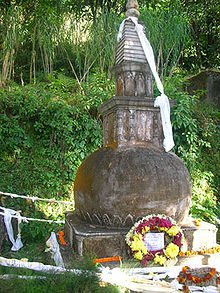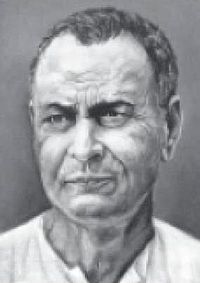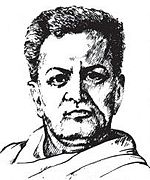- Rahul Sankrityayan
-
Rahul Sankrityayan
महापंडित राहुल सांकृत्यायनBorn April 9, 1893
Pandaha Village, Azamgarh District, Uttar Pradesh, British IndiaDied April 14, 1963 (aged 70)
Darjeeling, West Bengal, IndiaOccupation Writer, Essayist, Scholar, sociology, Indian Nationalist, History, Indology, Philosophy, Buddhism, Tibetology, Lexicography, Grammar, Textual Editing, Folklore, Science, drama, Politics, Polymath, Polyglot Nationality Indian Notable award(s) 1958: Sahitya Akademi Award
1963: Padma Bhushan
rahul-sankrityayan.co.nrMahapandit Rahul Sankrityayan (Hindi: राहुल सांकृत्यायन) (April 9, 1893 – April 14, 1963), who is called the Father of Hindi Travel literature, was one of the most widely-traveled scholars of India, spending forty-five years of his life on travels away from his home. He became a buddhist monk (Bauddha Bhikkhu) and eventually took up Marxist Socialism. Sankrityayan was also an Indian nationalist, having been arrested and jailed for three years for creating anti-British writings and speeches. He is referred as the Greatest Scholar (Mahapandit) for his scholarship. He was both a polymath as well as a polyglot.
Contents
Childhood
He was born Kedarnath Pandey on 9 April, 1893 to a Bhumihar Brahmin family in Azamgarh district, in Eastern Uttar Pradesh. His father, Govardhan Pandey, was a religious-minded farmer, a typical profession of Bhumihars, from the village Kanaila of Azamgarh district in Uttar Pradesh. His mother, Kulawanti, used to stay with her parents at the village of Pandaha, where Kedar was born. He was the eldest of four brothers. He spent part of his childhood in Uttar Pradesh and Bihar states of India. As his mother died at the age of twenty-eight and his father at the age of forty-five, he was brought up by his grandmother. His earliest memories as recorded by him were of the terrible famine in 1897. At age 9, he ran away from home in order to see the world, but later returned.
Sankrityayan only ever received formal schooling at a local primary school, though he later studied and mastered numerous languages independently, as well as learned photography.
Rahulji's sketch
 Rahulji's Tombstone at Darjeeling.
Rahulji's Tombstone at Darjeeling.
Travels
His travels took him to different parts of India, including Ladakh, Kinnaur, and Kashmir. He also covered several other countries including Nepal, Tibet, Sri Lanka, Iran, China, and the former Soviet Union. He spent some years of his life in the "Parsa Gadh" village of Saran District in Bihar.The entry gate of that village is named as "Rahul Gate". While traveling, he mostly used surface transport, and he went to certain countries clandestinely, like Tibet where he went disguised as a Buddhist monk. He made several trips to Tibet and brought from there valuable manuscripts of Pali and Sanskrit, several books and paintings. Most of these formed a part of the libraries of Vikramshila and Nalanda Universities and were taken to Tibet by fleeing Buddhist monks during 12th century and onwards when the invading Muslim armies had destroyed these universities. Some accounts state that Rahul Sankrityayan employed twenty-two mules to bring back the loads of part of these materials, from Tibet to India.
In honour of him, Patna Museum, Patna, has a special section, where a number of these and other items have been displayed.
Books
Sankrityayan was a multilingual linguist, well versed in several languages and dialects, including Hindi, Sanskrit, Pali, Bhojpuri, Urdu, Persian, Arabic, Tamil, Kannada, Tibetan, Sinhalese, French and Russian. He was also an Indologist, a Marxist theoretician, and a creative writer. He started writing during his twenties and had written around 150 books and dissertations covering a variety of subjects, including sociology, history, philosophy, Buddhism, Tibetology, lexicography, grammar, textual editing, folklore, science, drama, and politics, many of which were unpublished. He had translated Majjhima Nikaya from Prakrit to Hindi.[1]
One of his most famous books in Hindi is named Volga se Ganga, meaning “(A journey) from Volga to Ganga” and is an attempt to present a fictional account of migration of Aryans from the steppes of the Eurasia to regions around the Volga river; then their movements across the Hindukush and the Himalayas and the sub-Himalayan regions; and their spread to the Indo-Gangetic plains of the subcontinent of India. The book begins from 6000 BC and ends in 1942, the year when Mahatma Gandhi, the Indian nationalist leader has given a call for quit India movement. The book is remarkable for its historical elements interwoven with fiction. This book has been translated by K.N.Muthiya-Tamilputhakalayam in Tamil language as Valgavil irundu gangai varai and is still considered a bestseller and also translated in Telugu it inspiried many Telugu people."Volga muthal Ganga vare",the Malayalam translation of this book,became immensely popular among the young intellectuals of Kerala and it continues to be one of the most influential and one of a kind hi"storic" book of its times. More than ten of his books have been translated and published in Bengali. Mahapandit was awarded Padmabhushan in 1963 and Sahitya Akademi Award in 1958 for his book Madhya Asia ka Itihaas.
He maintained daily diaries in Sanskrit which were utilized fully while writing his autobiography. In spite of profound scholarship, he wrote in very simple Hindi, so that a common man could follow. He wrote books of varied interest. He was aware of limitations of Hindi literature and singularly made up the loss in no small measure. He wrote 146 books, some of which are voluminous. Many works remain unpublished. The well known historian Kashiprasad Jaisawal compared Rahul Sankrityayan with Buddha. Rahul's personality was as impressive and memorable as are his achievements. He travelled widely and wrote in five languages-Hindi, Sanskrit, Bhojpuri, Pāli and Tibetan. His published works include autobiography, biography, travelogue, sociology, history, philosophy, Buddhism, Tibetology, lexicography, grammar, textual editing, folklore, science, fiction, drama, essays, politics, and pamphleteering.
Soviet Union
Although he did not have any formal education, in view of his knowledge and command over the subject, University of Leningrad appointed him Professor of Indology in 1937-38 and again in 1947-48.
Awards In His Honor
Awards About Awarded By Rahul Sankrityayan National Award Contribution to Hindi travel Literature (also called Travel Litterateur's Honour). Kendriya Hindi Sansthan, Government of India Mahapandit Rahul Sankrityayan Paryatan Puraskar Awarded for contributing significantly in the field of travelogue and Discovery and Research in Hindi, for books written originally in Hindi on Tourism related subjects. Ministry Of Tourism, Government of India Gallery
Rahulji's Museum Picture Gallery at his Birthplace Pandaha.
Works by Rahul Sankrityayan
In Hindi
Novels
- Baisvin Sadi - 1923
- Jine ke Liye - 1940
- Simha Senapathi - 1944
- Jai Yaudheya - 1944
- Bhago Nahin, Duniya ko Badlo - 1944
- Madhur Svapna - 1949
- Rajasthani Ranivas - 1953
- Vismrit Yatri - 1954
- Divodas - 1960
- Vismriti Ke Garbh Me
- Kinner Desh
Short Stories
- Satmi ke Bachche - 1935
- Volga Se Ganga - 1944
- Bahurangi Madhupuri - 1953
- Kanaila ki Katha - 1955-56
Autobiography
- Meri Jivan Yatra I - 1944
- Meri Jivan Yatra II - 1950
- Meri Jivan Yatra III, IV, V - published posthumously
Biography
- Sardar Prithvi Singh - 1955
- Naye Bharat ke Naye Neta (2 volumes) - 1942
- Bachpan ki Smritiyan - 1953
- Atit se Vartaman (Vol I) - 1953
- Stalin - 1954
- Lenin - 1954
- Karl Marx - 1954
- Mao-Tse-Tung - 1954
- Ghumakkar Swami - 1956
- Mere Asahayog ke Sathi - 1956
- Jinka Main Kritajna - 1956
- Vir Chandrasingh Garhwali - 1956
- Simhala Ghumakkar Jaivardhan - 1960
- Kaptan Lal - 1961
- Simhal ke Vir Purush - 1961
- Mahamanav Budha - 1956
Some of his other books are:-
- Mansik Gulami
- Rhigvedic Arya
- Ghumakkar Shastra
- Kinnar desh mein
- Darshan Digdarshan
- Dakkhini Hindi ka Vyaakaran
- Puratatv Nibandhawali
- Manava Samaj
In Bhojpuri
- Teen Natak - 1942
- Panch Natak - 1942
In Nepali (Translation)
- Bauddhadharnma Darshan - 1984
Related to Tibetan
- Tibbati Bal-Siksha - 1933
- Pathavali (Vol. 1,2 & 3) - 1933
- Tibbati Vyakaran (Tibetan Grammar) - 1933
- Tibbat May Budh Dharm-1948
- Lhasa ki or
Himalaya Parichay Bhag 1 Himalaya Parichay Bhag 2 these are two of his books describing the people and their original places of migration in the Himalayas
-
This list is incomplete; you can help by expanding it.
See also
References
- Ram Sharan Sharma, Rahul Sankrityayan and Social Change, Indian History Congress, 1993.
- Ram Sharan Sharma, Rethinking India's Past, (Oxford University Press, 2009, ISBN 978-0195697872).
- Himalayan Buddhism, Past and Present: Mahapandit Rahul Sankrityayan centenary volume by D. C. Ahir (ISBN 81-7030-370-2)
- Prabhakar Machwe: "Rahul Sankrityayan" New Delhi 1978: Sahitya Akademi. [A short biography including a list of Sankrityayan's works]
Notes
- ^ Sharma, R.S. (2009). Rethinking India's Past. Oxford University Press. ISBN 978-0195697872.
External links
Works by Mahapandit Rahul Sankrityayan Novels Baisvin Sadi (1923) · Jine ke Liye (1940) · Simha Senapathi (1944) · Jai Yaudheya (1944) · Bhago Nahin, Duniya ko Badlo (1944) · Madhur Svapna (1949) · Rajasthani Ranivas (1953) · Vismrit Yatri (1954) · Divodas (1960) · Vismriti Ke Garbh MeShort Stories Satmi ke Bachche (1935) · Volga Se Ganga (1944) · Bahurangi Madhupuri (1953) · Kanaila ki Katha (1955-1956)Autobiography Meri Jivan Yatra I (1944) · Meri Jivan Yatra II (1950) · Meri Jivan Yatra III (Published Posthumously) · Meri Jivan Yatra IV (Published Posthumously) · Meri Jivan Yatra V (Published Posthumously)Biography Sardar Prithvi Singh (1955) · Naye Bharat ke Naye Neta (2 volumes) (1942) · Bachpan ki Smritiyan (1953) · Atit se Vartaman (Vol I) (1953) · Stalin (1954) · Lenin (1954) · Karl Marx (1954) · Mao-Tse-Tung (1954) · Ghumakkar Swami (1956) · Ghumakkar Swami (1956) · Jinka Main Kritajna (1956) · Vir Chandrasingh Garhwali (1956) · Simhala Ghumakkar Jaivardhan (1960) · Kaptan Lal (1961) · Simhal ke Vir Purush (1961) · Mahamanav Budha (1956)Other Books Mansik Gulami · Rhigvedic Arya · Ghumakkar Shastra · Kinnar Desh Mein · Darshan Digdarshan · Dakkhini Hindi ka Vyaakaran · Puratatv Nibandhawali · Manava SamajIn Bhojpuri Teen Natak (1942) · Panch Natak (1942)Related to Tibetan Tibbati Bal-Siksha (1933) · Pathavali (Vol. 1,2 & 3) (1933) · Tibbati Vyakaran (Tibetan Grammar) (1933) · Tibbat May Budh Dharm (1948)-
This list is incomplete; you can help by expanding it.
Indian independence movement History Colonisation · East India Company · British India · French India · Portuguese India · Plassey · Buxar · Anglo-Mysore Wars · Anglo-Maratha Wars (First · Second · Third) · Polygar War · Vellore Mutiny · First Anglo-Sikh War · Second Anglo-Sikh War · Rebellion of 1857 · British Raj · more





Philosophies
and ideologiesIndian nationalism · Swaraj · Hindu nationalism · Gandhism · Satyagraha · Indian Muslim nationalism · Swadeshi · Socialism · Khilafat MovementEvents and
movementsPartition of Bengal · Revolutionaries · Delhi-Lahore Conspiracy · The Indian Sociologist · The Sedetious conspiracy · Champaran and Kheda · Rowlatt Committee · Rowlatt Bills · Jallianwala Bagh Massacre · Non-Cooperation · Qissa Khwani Bazaar massacre · Flag Satyagraha · Bardoli · 1928 Protests · Nehru Report · Purna Swaraj · Salt Satyagraha · Round table conferences · Act of 1935 · Legion Freies Indien · Cripps' mission · Quit India · Indian National Army · Tiger Legion · Bombay Mutiny · Coup d'État de Yanaon · Provisional Government of IndiaOrganisations Indian National Congress · All-India Muslim League · Anushilan Samiti · Jugantar · Arya Samaj · Rashtriya Swayamsevak Sangh · India House · Berlin Committee · Ghadar · Home Rule · Khaksar Tehrik · Khudai Khidmatgar · Hindustan Republican Association · Swaraj Party · Indian Independence League · All India Kisan Sabha · Azad Hind · moreSocial
reformersMohandas Karamchand Gandhi · Rahul Sankrityayan · Mahatma Jyotirao Phule · Gopal Ganesh Agarkar · Shahu Maharaj · Dr. Babasaheb Ambedkar · Dhondo Keshav Karve · Vitthal Ramji Shinde · Mahadev Govind Ranade · Swami Dayananda Saraswati · Ramakrishna · Swami Vivekananda · Swami Sahajanand Saraswati · Vakkom Moulavi · Vinoba Bhave · Baba Amte · Ram Mohan Roy · Gopal Hari DeshmukhIndian
independence
activistsPuli Thevar · Yashwantrao Holkar · Rahul Sankrityayan · Swami Sahajanand Saraswati · Tipu Sultan · Veerapandiya Kattabomman · Sangolli Rayanna · Baba Ram Singh · Mangal Pandey · Rae Ahmed Nawaz Khan Kharal · Bakht Khan · Veer Kunwar Singh · Rani of Jhansi · Bahadur Shah Zafar · Swami Dayanand Saraswati · Bal Gangadhar Tilak · Gopal Krishna Gokhale · Dadabhai Naoroji · Bhikaiji Cama · Shyamji Krishna Varma · Annie Besant · Har Dayal · Subramanya Bharathi · Lala Lajpat Rai · Bipin Chandra Pal · Rash Behari Bose · Chittaranjan Das · Bidhan Chandra Roy · Khan Abdul Ghaffar Khan · Maulana Azad · Ashfaqullah Khan · Ram Prasad Bismil · Chandrasekhar Azad · Rajaji · K. M. Munshi · Bhagat Singh · Sarojini Naidu · Achyut Patwardhan · Purushottam Das Tandon · Alluri Sitaramaraju · M. Ali Jinnah · Sardar Patel · Vakkom Majeed · Subhash Chandra Bose · Jawaharlal Nehru · Mohandas Karamchand Gandhi · Allama Mashriqi · Accamma Cherian · Swadeshabhimani Ramakrishna Pillai · Kotwal Dhan Singh Gurjar · V. K. Krishna Menon · A. J. John, Anaparambil · more
British leaders Independence Simla Conference · Cabinet Mission · Indian Independence Act · Partition of India · Political integration · Constitution · Republic of IndiaNotable Hindi writers - Rambriksh Benipuri
- Sachchidananda Hirananda Vatsyayan 'Ajneya'
- Rahul Sankrityayan
- Harivansh Rai Bachchan
- Dharamvir Bharati
- Subhadra Kumari Chauhan
- Makhanlal Chaturvedi
- Ramdhari Singh 'Dinkar'
- Mahavir Prasad Dwivedi
- Swami Sahajanand Saraswati
- Dushyant Kumar
- Hazari Prasad Dwivedi
- Maithili Sharan Gupt
- Acharya Kuber Nath Rai
- Bharatendu Harishchandra
- Kamleshwar
- Gajanan Madhav Muktibodh
- Suryakant Tripathi 'Nirala'
- Sumitranandan Pant
- Jaishankar Prasad
- Munshi Premchand
- Mohan Rakesh
- Nagarjun
- Phanishwar Nath 'Renu'
- Viveki Rai
- Bhadant Anand Kausalyayan
- Acharya Shivpujan Sahay
- Bhisham Sahni
- Nathuram Sharma 'Shankar'
- Shivani
- Krishna Sobti
- Shivmangal Singh Suman
- Mahadevi Varma
- Pandit Nalin Vilochan Sharma
- Nirmal Verma
- Maitreyi Pushpa
- Vibhuti Narain Rai
 Categories:
Categories:- 1893 births
- 1963 deaths
- Converts to Buddhism
- Hindi-language writers
- People from Azamgarh
- Indian Indologists
- Linguists
- Indian linguists
- Indian Buddhists
- Indian Marxists
- Indian writers
- Recipients of the Sahitya Akademi Award
- Recipients of the Sahitya Akademi Award in Hindi
- Recipients of the Padma Bhushan
- Sanskrit scholars
- Tibetologists
Wikimedia Foundation. 2010.







